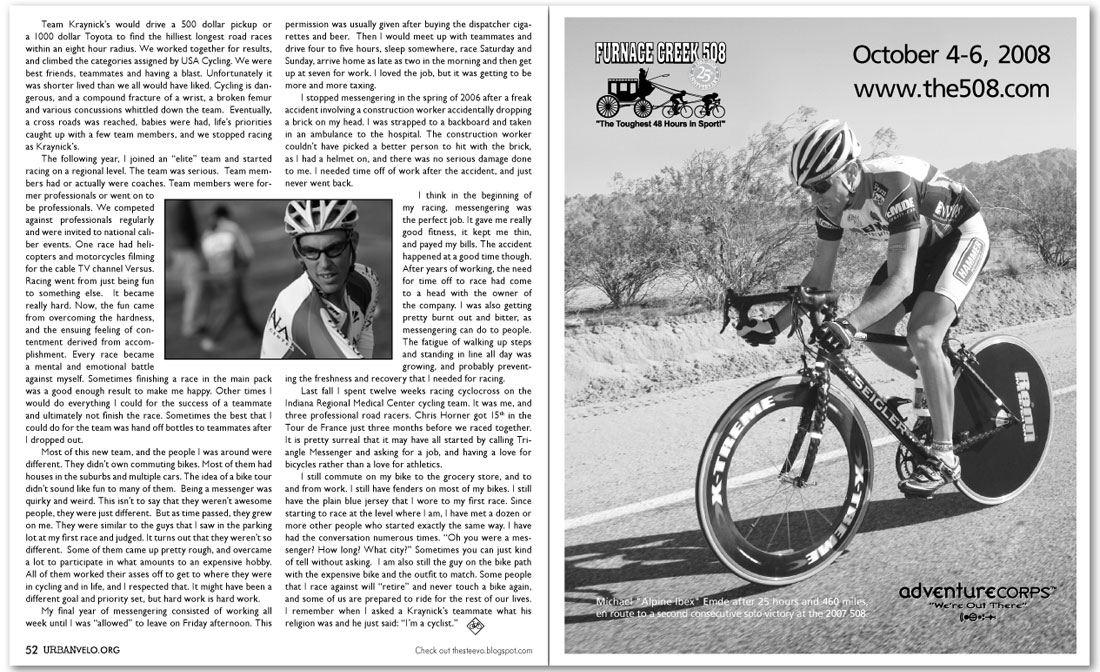Team Kraynick’s would drive a 500 dollar pickup or a 1000 dollar Toyota to find the hilliest longest road races within an eight hour radius. We worked together for results, and climbed the categories assigned by USA Cycling. We were best friends, teammates and having a blast. Unfortunately it was shorter lived than we all would have liked. Cycling is dangerous, and a compound fracture of a wrist, a broken femur and various concussions whittled down the team. Eventually, a cross roads was reached, babies were had, life’s priorities caught up with a few team members, and we stopped racing as Kraynick’s.
The following year, I joined an “elite” team and started racing on a regional level. The team was serious. Team members had or actually were coaches. Team members were former professionals or went on to be professionals. We competed against professionals regularly and were invited to national caliber events. One race had helicopters and motorcycles filming for the cable TV channel Versus. Racing went from just being fun to something else. It became really hard. Now, the fun came from overcoming the hardness, and the ensuing feeling of contentment derived from accomplishment. Every race became a mental and emotional battle against myself. Sometimes finishing a race in the main pack was a good enough result to make me happy. Other times I would do everything I could for the success of a teammate and ultimately not finish the race. Sometimes the best that I could do for the team was hand off bottles to teammates after I dropped out.
Most of this new team, and the people I was around were different. They didn’t own commuting bikes. Most of them had houses in the suburbs and multiple cars. The idea of a bike tour didn’t sound like fun to many of them. Being a messenger was quirky and weird. This isn’t to say that they weren’t awesome people, they were just different. But as time passed, they grew on me. They were similar to the guys that I saw in the parking lot at my first race and judged. It turns out that they weren’t so different. Some of them came up pretty rough, and overcame a lot to participate in what amounts to an expensive hobby. All of them worked their asses off to get to where they were in cycling and in life, and I respected that. It might have been a different goal and priority set, but hard work is hard work.
My final year of messengering consisted of working all week until I was “allowed” to leave on Friday afternoon. This permission was usually given after buying the dispatcher cigarettes and beer. Then I would meet up with teammates and drive four to five hours, sleep somewhere, race Saturday and Sunday, arrive home as late as two in the morning and then get up at seven for work. I loved the job, but it was getting to be more and more taxing.
I stopped messengering in the spring of 2006 after a freak accident involving a construction worker accidentally dropping a brick on my head. I was strapped to a backboard and taken in an ambulance to the hospital. The construction worker couldn’t have picked a better person to hit with the brick, as I had a helmet on, and there was no serious damage done to me. I needed time off of work after the accident, and just never went back.
I think in the beginning of my racing, messengering was the perfect job. It gave me really good fitness, it kept me thin, and payed my bills. The accident happened at a good time though. After years of working, the need for time off to race had come to a head with the owner of the company. I was also getting pretty burnt out and bitter, as messengering can do to people. The fatigue of walking up steps and standing in line all day was growing, and probably preventing the freshness and recovery that I needed for racing.
Last fall I spent twelve weeks racing cyclocross on the Indiana Regional Medical Center cycling team. It was me, and three professional road racers. Chris Horner got 15th in the Tour de France just three months before we raced together. It is pretty surreal that it may have all started by calling Triangle Messenger and asking for a job, and having a love for bicycles rather than a love for athletics.
I still commute on my bike to the grocery store, and to and from work. I still have fenders on most of my bikes. I still have the plain blue jersey that I wore to my first race. Since starting to race at the level where I am, I have met a dozen or more other people who started exactly the same way. I have had the conversation numerous times. “Oh you were a messenger? How long? What city?” Sometimes you can just kind of tell without asking. I am also still the guy on the bike path with the expensive bike and the outfit to match. Some people that I race against will “retire” and never touch a bike again, and some of us are prepared to ride for the rest of our lives. I remember when I asked a Kraynick’s teammate what his
religion was and he just said: “I’m a cyclist.”
